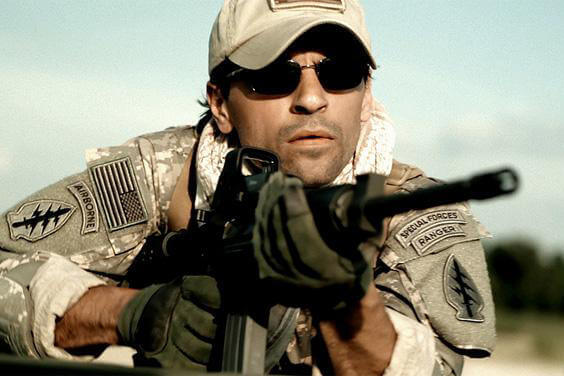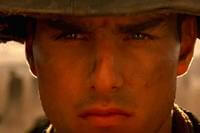"Approaching Midnight," a movie about a young veteran returning from war who discovers corruption and death in his hometown, will premiere at The American Legion's National Convention in Houston.
The private screening of Approaching Midnight will be at 7:30 p.m. Monday, Aug. 26, in the George R. Brown Convention Center, General Assembly Theater, Level 3. Admission is free.
Around 60 Department of Michigan Legionnaires contributed to the 86-minute-long film, acting as extras and serving as consultants. In fact, Legionnaires wear their Legion uniforms during a scene involving the honor guard.
The catalyst of connecting the Legion with the filmmaker was movie-co-star Michelle Lynne Balser, the granddaughter of Staff Sgt. William Genette, who was a POW during World War II. Balser remembers visiting Oldenburg Post 216 in Milford, Mich., as a young girl.
One night after "Approaching Midnight" is shown at the Legion convention, the movie will make its public world premiere in Detroit. Part of the proceeds from that screening will be donated to Post 216. (Tickets for the public premiere can be purchased here. A trailer for the movie may be seen here)
American Legion posts may purchase a copy of the film for one-time event screening as part of a fundraising effort.
Sam Logan Khaleghi - whose family moved from Iran to Detroit when he was very young - wrote, acted, directed and produced the movie. The American Legion talked with Khaleghi about his project and the Legion's involvement:
TAL: How did you first develop the concept for this story?
SLK: I loved military-themed dramas growing up, whether they were comedies, sci-fi themes. It didn't matter what it was. "Apocalypse Now," "Blackhawk Down," "Saving Private Ryan," "Battle Los Angeles." … For me, I wanted to tell a story about heroes. The everyday heroes that we have around us. People who don't share the same blood as you, but they shed the same blood as you. And tears and sweat. There's a mysticism and heroism in that group dynamic. And that's the kind of film I wanted to make.
TAL: Tell me about your character in the film, Staff Sgt. Wesley Kent.
SLK: There is a quiet to him, a very stoic nature to him. He's really not known anything else. He was promoted within the ranks during his tours, served right fresh out of college. He signed up with the idea that he would serve six, seven years and so when he gets back this quietness is starting to rumble a little bit.
TAL: How did you accomplish that in the film?
SLK: We looked at the character who is a staff sergeant in the U.S. Army. And he's worked with special operations. This character is a trained soldier in the United States Army. He's going to walk with a confidence and a quiet, too. Knowing what he wants, he doesn't need to say it. Our strategy was to show you, by his actions, by the way he walks, by how he decides what to do. That's what leads to some of those thrilling moments in the movie.
TAL: What research did you do so the movie would be accurate?
SLK: The research was the real people we had involved. The American Legion members we had there and veterans from the recent conflicts who were there. So many of the actors and consultants were veterans. They were there to literally make sure that all the nitty-gritty details of how we walked, how we talked, and the uniforms were all accurate, or as accurate as we could make them due to budgetary restrictions. And we were able to do that because so many of the members of the Legion were involved. They were there to tell us, 'Hey, we would do this.' And we would say, 'Great, that's fantastic. Show us.'
TAL: Do you have an example of the lengths you went to in order to be accurate?
SLK: We shot a scene that takes place in Walter Reed, obviously we shot it at another hospital. We filmed it at a local working hospital in the Detroit area. But we dressed it to look like Walter Reed. We filmed a scene there and my character walked into the hallway and I put my cap on. And then one of the cast members who was a veteran was watching it and said, 'Sam, you have to re-film this scene.' I said, 'What are you talking about?' That means I need to go back to the hospital, get new permits, close it off, dress the scene again and do everything all over again just for that?' And he says, 'That's what you have to do because that's wrong. He would not have put his cap on inside while walking to an elevator.' We went back, completely re-filmed that scene to get that right because I didn't want anyone wondering why he was wearing his patrol cap inside. It was expensive to go back and film that but it was worth it.
TAL: What was the most interesting thing you learned during your research, writing and filming?
SLK: The most interesting thing that I learned was that I wanted to tell more stories. William Genette has an amazing story. He came back after being a prisoner of war who was pronounced dead. Years later, he knocks on the front door and his wife answers it, and he's 100 pounds lighter. All the veterans from that era have amazing stories. You hear one story and then another. Any one of these stories could be a 2 ½-hour epic that is adventurous and heart-warming and reaches a global, not just a national, audience. Talk about humanity and love. That's the greatest thing I learned in doing this movie: every single person has a hero in them.
TAL: What's going to be going through your mind at the world premiere in Detroit on Aug. 27?
SLK: Fear. (Pause.) What's going to be going through my mind is all those years of blood, sweat and tears. At the same time, it's like art imitating life. The cast and crew were very much like a platoon. We became like a family. There were a lot of fights and disagreements. But there was a lot of dialog, a lot of meetings a lot of laughs, all of those elements … That's what we went through. Remembering all those moments and being proud of what we're showcasing to the world.














